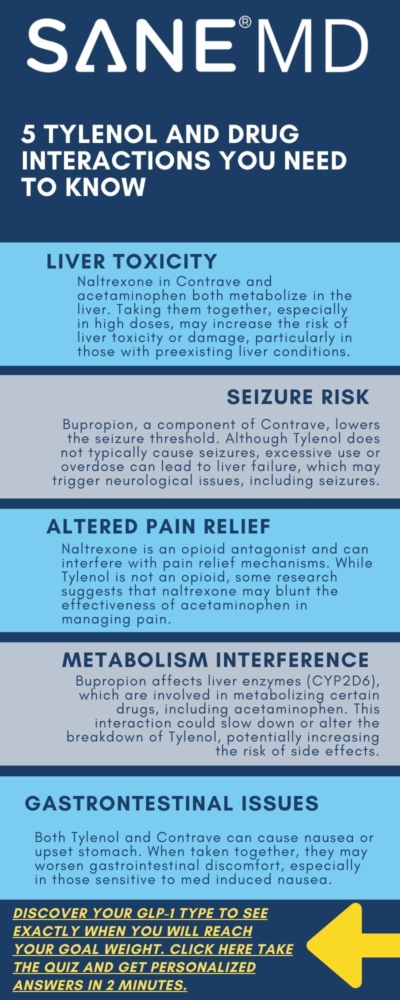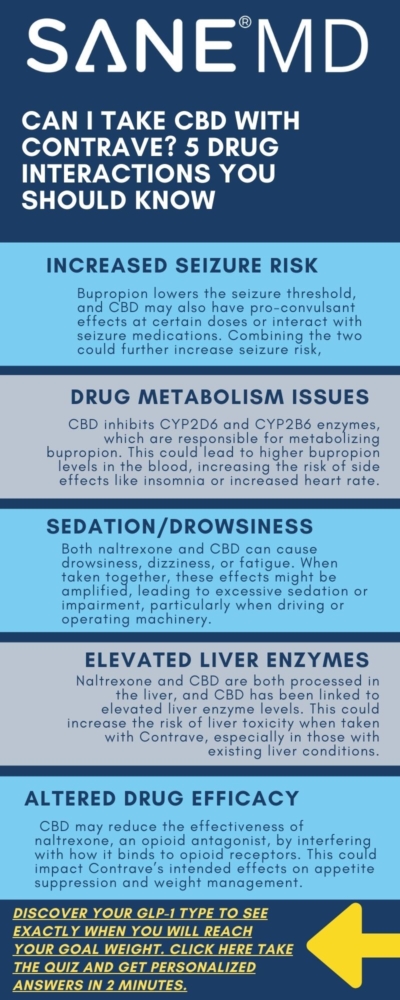Tylenol and Contrave Drug Interactions: A Risky Combo?

When managing weight loss with Contrave, understanding potential drug interactions is crucial for safety. Many people turn to over-the-counter drugs like Tylenol for pain relief, but mixing medications isn’t always risk-free. Tylenol and Contrave drug interactions can lead to adverse reactions, including an increased risk of seizure threshold reduction, blood pressure changes, and potential liver concerns.
Contrave is specifically prescribed for chronic weight management in compatible adults who are overweight or obese, and it should be used alongside a reduced-calorie diet and regular physical activity to maximize its effectiveness and safety. In clinical trials, Contrave has demonstrated effectiveness in aiding weight loss when paired with a reduced-calorie diet and lifestyle changes.
Contrave is not recommended for use in children or adolescents under 18 years old due to safety concerns. The combination of medications in Contrave, specifically bupropion and naltrexone, may pose an increased risk of side effects in younger individuals, including potential impacts on mental health and increased blood pressure. Parents and guardians are advised to consult healthcare professionals before considering weight management options for children and adolescents.
Since both bupropion and naltrexone affect the nervous system and metabolism, adding another medication—even one as common as Tylenol—can alter drug effects in unexpected ways. Whether you’re using Contrave for chronic weight management or as part of a reduced-calorie diet, it’s essential to understand how it interacts with other medications.
This article explores the possible risks of combining Tylenol with Contrave, including its impact on high blood pressure, the risk of seizures, and necessary dose adjustments. Knowing these risks is essential for determining if Contrave is the right fit for your weight loss journey. If you’re taking Contrave, here’s what you need to know before reaching for a bottle of Tylenol.
Key Takeaways
- Tylenol and Contrave drug interactions may pose potential risks, including an increased risk of side effects such as seizure threshold reduction and blood pressure changes.
- Individuals taking Contrave should consult their doctor or pharmacist before using over-the-counter drugs like Tylenol to assess other risk factors and ensure safe use.
- A dose adjustment or alternative treatment may be necessary for people with medical conditions such as severe hepatic impairment, bipolar disorder, or a history of opioid withdrawal symptoms.
Understanding Contrave: A Weight Loss Medication with Risks
What is Contrave and what does it do? Contrave combines two active ingredients: naltrexone, an opioid antagonist, and bupropion, a norepinephrine-dopamine reuptake inhibitor. Together, these components help with weight loss by influencing the brain’s reward system and appetite regulation.
Proper hydration is important for Contrave patients, as it can help reduce side effects such as nausea and constipation. Drinking adequate amounts of water can also help manage these symptoms and support overall digestive health during treatment.
Additionally, patients are advised to avoid high-fat meals when taking Contrave, as these can elevate the risk of side effects and interfere with the medication’s effectiveness.
Tylenol and Contrave Drug Interactions Summary
| Risk Factor | Cause | Who is at Risk? | Precautionary Steps |
|---|---|---|---|
| Liver Damage | Both Contrave and Tylenol are metabolized in the liver, increasing stress on liver function. | Individuals with pre-existing liver conditions or severe hepatic impairment. | Consult a doctor before taking both medications; avoid excessive Tylenol use. |
| Blood Pressure Changes | Contrave can raise blood pressure; high doses of Tylenol may contribute to elevated blood pressure. | People with high blood pressure or a history of cardiovascular disease. | Monitor blood pressure regularly; consult a doctor before combining medications. |
| Seizure Risk | Contrave lowers seizure threshold; Tylenol overdose may cause neurological effects. | Those with a seizure disorder, a history of alcohol withdrawal, or on other seizure-lowering medications. | Avoid use if prone to seizures; consult a doctor before combining medications. |
| Suicidal Thoughts & Mental Health Effects | Contrave has a boxed warning for suicidal thoughts; combined effects with Tylenol on mood are unclear. | Individuals with bipolar disorder, depression, or other mental health conditions. | Monitor mental health closely; report mood changes to a healthcare provider. |
| Allergic Reactions | Some individuals may be allergic to acetaminophen, bupropion, or naltrexone. | Individuals with known allergies to any of the drug components. | Seek immediate medical help if symptoms like rash, swelling, or difficulty breathing occur. |
| Opioid Withdrawal Symptoms | Contrave contains naltrexone, which can trigger withdrawal symptoms in opioid-dependent individuals. | People with a history of opioid use or those in recovery from opioid dependence. | Avoid Contrave if currently using opioids; consult a doctor for alternatives. |
| Serotonin Syndrome | Contrave’s bupropion component can interact with serotonergic drugs, leading to excessive serotonin buildup. | Individuals taking SSRIs, SNRIs, MAOIs, or other serotonergic medications. | Consult a doctor if taking serotonergic drugs; seek emergency care for serotonin syndrome symptoms. |
Tylenol and Contrave Drug Interactions: What You Need to Know
Tylenol (acetaminophen) is one of the most common over-the-counter drugs used to relieve pain and reduce fever. However, when combined with Contrave, certain drug interactions may occur, increasing the likelihood of adverse reactions and affecting systemic exposure to both drugs.
Below are some potential risks of combining Tylenol and Contrave.
1. Increased Risk of Liver Damage
Both bupropion hydrochloride (found in Contrave) and Tylenol are metabolized in the liver. Taking them together can increase stress on the liver, leading to severe hepatic impairment in individuals with pre-existing liver disease or other medical conditions.
Tell your doctor if you have liver problems before taking Contrave, as you may need a dose adjustment or a different pain management approach.
2. Blood Pressure Concerns
Contrave can increase blood pressure, particularly during treatment initiation. While Tylenol is generally considered safe, it has been linked to slight increases in blood pressure in some individuals, especially at high doses.
If you have high blood pressure, tell your doctor immediately before combining these medications to avoid increased risk of cardiovascular issues.
3. Seizure Risk and Threshold Lowering
One of the most serious Contrave interactions involves its potential to lower the seizure threshold. Both bupropion and naltrexone affect neurological function, and Tylenol overdose has been associated with neurological side effects.
Individuals with a seizure disorder or who have a history of suddenly stopping drinking alcohol are at a higher risk. Tell your doctor if you have a history of seizures or other mental health conditions before using these medications together.
4. Risk of Suicidal Thoughts and Mental Health Effects
The boxed warning for Contrave underscores the heightened risk of suicidal thoughts and behaviors, particularly in adults and individuals aged 24 years and younger. This risk is especially pertinent for those using Contrave to treat depression or individuals with pre-existing mental health conditions.
Tylenol itself does not directly cause mental health changes, but the combination of both drugs may exacerbate mood-related side effects. If you experience suicidal thoughts, contact a doctor immediately, a local emergency number, or the Suicide and Crisis Lifeline for support.
Who Should Be Cautious?
While Tylenol is widely considered safe for most people, certain individuals should take extra precautions when using it alongside Contrave, especially those with a history of allergic reactions to acetaminophen, bupropion, or naltrexone.
The combination of these medications can lead to increased risk of side effects, including liver strain, cardiovascular complications, and neurological concerns.
Individuals with Medical Conditions
Certain populations are particularly vulnerable to Contrave interactions, and extra caution is advised when combining it with Tylenol.
These groups include:
1. Individuals with High Blood Pressure or a History of Cardiovascular Disease
Contrave has been known to increase blood pressure, particularly during the treatment initiation phase. Individuals with high blood pressure or a history of cardiovascular disease may experience further increased risk of heart-related complications when taking Contrave.
Tylenol is generally considered safer than nonsteroidal anti-inflammatory drugs (NSAIDs) for people with heart conditions, as it does not significantly increase blood pressure. However, some studies suggest that frequent or high-dose acetaminophen use can still contribute to elevated blood pressure levels.
If you have a history of high blood pressure, you must inform your doctor before taking Tylenol with Contrave. Regular blood pressure monitoring may be necessary to detect any concerning changes.
2. Individuals with Severe Hepatic Impairment
Both bupropion naltrexone (the active ingredients in Contrave) and Tylenol are processed through the liver. Severe hepatic impairment can reduce the body’s ability to metabolize these drugs effectively, leading to a higher risk of side effects and potential liver toxicity.
Tylenol overdose is a leading cause of acute liver failure, and Contrave also places additional strain on liver function. If you have severe hepatic impairment or any form of liver disease, tell your doctor before using either medication, as a dose adjustment or alternative treatment may be required.
3. Individuals with Bipolar Disorder or Other Mental Health Conditions
Contrave carries a boxed warning due to its potential to increase the risk of suicidal thoughts and behaviors, particularly in individuals using it to treat depression or those with underlying mental health conditions such as bipolar disorder.
While Tylenol itself does not have known effects on mental health, some evidence suggests that acetaminophen may influence mood regulation by altering emotional processing in the brain.
Individuals with bipolar disorder or other mental health conditions should be closely monitored when taking Contrave. If you experience suicidal thoughts, mood swings, or mental health changes, seek medical help immediately by contacting your doctor immediately, calling a local emergency number, or reaching out to the Suicide and Crisis Lifeline.
4. Individuals with a History of Opioid Withdrawal Symptoms
Since Contrave contains naltrexone hydrochloride, which is commonly used in opioid withdrawal treatment, individuals with a history of opioid dependence may experience opioid withdrawal symptoms if they unknowingly take opioids while on Contrave.
Tylenol itself does not interact with opioids, but individuals undergoing opioid withdrawal should be cautious about adding any new medications, including over-the-counter drugs. If you have a history of opioid withdrawal symptoms, discuss potential Contrave interactions with your doctor or pharmacist before taking Tylenol.
5. Individuals with Seizure Disorder or Other Neurological Issues
One of the most significant risks associated with Contrave is its ability to lower the seizure threshold, increasing the likelihood of seizures. This risk is particularly concerning for individuals with a seizure disorder or those with a history of neurological issues.
Tylenol itself does not typically cause seizures, but combining it with Contrave can increase the risk of seizures, especially in individuals who:
- Have a low seizure threshold
- Have a history of suddenly stopping drinking alcohol
- Are taking medications that further lower seizure resistance
If you have a seizure disorder, tell your doctor before using Contrave or Tylenol, as a dosage adjustment may be necessary to minimize the risk. Patients should consult healthcare providers about all medical conditions before starting Contrave treatment.
Those Taking Other Medications
The risk of Contrave interactions is significantly higher when combined with other medications that affect the liver, nervous system, or metabolic pathways. Some drugs can amplify adverse reactions, while others may reduce Contrave’s effectiveness.

1. Other Weight Loss Drugs
Many individuals taking Contrave may also consider other weight loss drugs, such as phentermine or GLP-1 receptor agonists. However, using multiple weight loss medications simultaneously can increase the risk of cardiovascular strain, high blood pressure, and other side effects.
Since Contrave already combines two active ingredients (bupropion naltrexone), adding another weight loss therapy can introduce unpredictable drug interactions. Always tell your doctor if you are using other weight loss drugs to ensure safe use.
2. Opioid Withdrawal Treatments
Contrave contains naltrexone hydrochloride, which blocks the effects of opioids and is sometimes used for opioid withdrawal management. However, individuals who are currently taking opioid medications or undergoing opioid withdrawal treatments should not take Contrave, as it can trigger opioid withdrawal symptoms.
If you are receiving treatment for opioid withdrawal or opioid dependence, consult your doctor or pharmacist before starting Contrave, as it may require a dose adjustment or alternative approach.
3. Antidepressants That Affect the Serotonergic Neurotransmitter System
Since Contrave contains bupropion hydrochloride, which is also used to treat depression, combining it with other antidepressants—especially selective serotonin reuptake inhibitors (SSRIs) or serotonin-norepinephrine reuptake inhibitors (SNRIs)—can pose a risk of serotonin syndrome. For example, taking Contrave and Zoloft together can lead to potentially serious drug interactions, such as serotonin syndrome.
Serotonin syndrome occurs when excessive serotonin accumulates in the brain, leading to symptoms such as:
- Confusion
- Agitation
- Rapid heartbeat
- High fever
- Muscle rigidity
Combining Contrave with a monoamine oxidase inhibitor (MAOI) is strongly discouraged, as it can lead to dangerously high blood pressure levels. This interaction poses a significant risk and should be avoided to ensure safe use of both medications.
4. Dietary Supplements That May Interfere with Metabolism
Certain dietary supplements can affect how Contrave and Tylenol are metabolized, potentially altering their effectiveness or leading to unexpected side effects.
Supplements that may pose increased risk include:
- St. John’s Wort – Can increase metabolism and reduce Contrave’s effectiveness
- Caffeine-based supplements – May contribute to high blood pressure and overstimulation
- Herbal supplements for weight loss – Can cause unpredictable interactions with Contrave
Always tell your doctor about any dietary supplements or other medications you are taking to avoid unnecessary risks.
How to Minimize Risk?
Taking precautions when combining Tylenol and Contrave is essential to reduce the likelihood of adverse reactions and potential health complications. While these medications may seem unrelated, they can interact in ways that impact blood pressure, seizure threshold, and the body’s ability to metabolize drugs.
By following these guidelines, you can lower your increased risk of experiencing side effects and ensure safer Contrave treatment.
1. Talk to Your Doctor or Pharmacist
Open communication with a doctor or pharmacist is one of the best ways to prevent contrave interactions. Since both bupropion and naltrexone affect neurotransmitters and metabolism, it’s critical to disclose all other medications, including over-the-counter drugs, dietary supplements, and other weight loss drugs, to avoid dangerous drug interactions.
Dr. Matthew Olesiak, MD, Chief Medical Director at SANE MD, explains:
“Contrave is a complex medication that affects multiple systems in the body, including the nervous and cardiovascular systems. Combining it with other drugs, even common ones like Tylenol, can lead to unintended effects. That’s why it’s so important for patients to inform their healthcare providers about every medication they take, including vitamins and supplements.”
Additionally, individuals who have mental health conditions, seizure disorders, or a history of opioid withdrawal symptoms should take extra precautions, as they may require specialized guidance or dose adjustments.
2. Consider Dose Adjustments
In some cases, a dosage adjustment may be necessary to reduce the risk of side effects when combining Contrave with Tylenol. This is especially important for individuals with:
- High blood pressure – Since Contrave can increase blood pressure, careful monitoring and potential adjustments may be required.
- A history of seizures – Because Contrave lowers the seizure threshold, minimizing additional risks from other drugs is crucial.
- Liver conditions – Both drugs are metabolized in the liver, making dose adjustments necessary for those with severe hepatic impairment.
- Opioid withdrawal symptoms – Those recovering from opioid dependence need to be cautious, as Contrave’s naltrexone hydrochloride can trigger withdrawal effects.
Patients should tell their doctor immediately if they experience unusual symptoms, such as dizziness, increased heart rate, or severe nausea, as these may indicate the need for a dose adjustment.
3. Monitor for Symptoms of Serotonin Syndrome
Serotonin syndrome occurs when medications that influence the serotonergic neurotransmitter system interact, leading to excessive serotonin levels in the brain. While Contrave is not a direct serotonergic drug, its bupropion hydrochloride component can interact with other medications, increasing the risk of serotonin toxicity—especially when taken alongside antidepressants or other drugs that impact serotonin levels.
Symptoms of serotonin syndrome include:
- Confusion or difficulty thinking clearly
- Rapid heart rate and high blood pressure
- High fever and sweating
- Tremors, muscle stiffness, or twitching
This condition is a medical emergency, and anyone experiencing these symptoms should seek immediate care by calling a local emergency number or visiting an emergency room.
Frequently Asked Questions (FAQ) on Tylenol and Contrave Drug Interactions
When taking Contrave, it’s natural to wonder about potential drug interactions, especially when it comes to common over-the-counter drugs like Tylenol. Since bupropion naltrexone affects multiple systems in the body, some medications may pose a higher risk of side effects, while others may require dose adjustments for safe use.
Below are answers to frequently asked questions about using Tylenol and other pain relievers while on Contrave.
1. Can I take Tylenol while on bupropion?
Yes, in most cases, Tylenol (acetaminophen) can be taken alongside bupropion hydrochloride, which is one of the two active ingredients in Contrave. However, both medications are processed in the liver, so individuals with severe hepatic impairment should be cautious, as excessive use of Tylenol can contribute to liver damage.
Additionally, because bupropion lowers the seizure threshold, those with a history of seizure disorder should consult a doctor or pharmacist before using Tylenol, especially in high doses.
2. What medications should I avoid with Contrave?
There are several other medications that may cause adverse reactions or require dose adjustments when taken with Contrave.
You should avoid or use caution with:
- Opioid-based pain relievers (e.g., oxycodone, hydrocodone) since naltrexone hydrochloride blocks opioid effects and may trigger opioid withdrawal symptoms.
- Antidepressants (especially SSRIs, SNRIs, and MAOIs), as they can interact with bupropion and increase the risk of serotonin syndrome.
- Other weight loss drugs, as combining them with Contrave may increase blood pressure or lead to excessive weight loss.
- Seizure medications, since bupropion already lowers the seizure threshold, increasing the risk of seizures.
Always tell your doctor about any other medications you are taking to prevent dangerous contrave interactions.
3. What can I take for a headache while on Contrave?
If you develop a headache while taking Contrave, Tylenol (acetaminophen) is generally the safest option for pain relief. Unlike NSAIDs (such as ibuprofen or aspirin), Tylenol does not significantly impact blood pressure, making it a preferred choice for individuals concerned about high blood pressure while on Contrave.
However, frequent headaches could indicate that your body is adjusting to the medication, and in some cases, a dose adjustment may be necessary. If headaches persist or worsen, tell your doctor immediately to explore other potential causes and treatment options.
4. Is it safe to take Tylenol with naltrexone?
Yes, Tylenol is generally considered safe to use with naltrexone hydrochloride, one of Contrave’s two active ingredients. However, since the liver processes both drugs, excessive or long-term use of Tylenol can increase the risk of severe hepatic impairment, particularly in individuals with pre-existing liver conditions.
If you experience signs of liver stress—such as jaundice, dark urine, or persistent nausea—contact your doctor immediately.
5. What pain medicine can I take with Contrave?
For relieving mild to moderate pain, Tylenol (acetaminophen) is generally the preferred choice when taking Contrave, since it does not affect bupropion naltrexone. Alternatively, NSAIDs like ibuprofen or naproxen may be used, though they should be taken with care by those with high blood pressure due to their potential contribution to cardiovascular issues.
Opioid-based pain relievers should be strictly avoided while on Contrave due to the risk of opioid withdrawal symptoms triggered by naltrexone hydrochloride.
If you require pain management for chronic conditions, discuss alternative treatments with your doctor or pharmacist to ensure that your Contrave treatment remains safe and effective.
Final Thoughts
While Tylenol and Contrave are commonly used medications, certain drug interactions can pose risks. Always consult a doctor or pharmacist before combining these drugs, especially if you have other risk factors, such as high blood pressure, severe hepatic impairment, or a history of seizures. A dose adjustment may help reduce the risk of side effects, ensuring a safer approach to weight management.
If you experience unusual side effects, contact your doctor immediately or call a local emergency number for assistance.

Can I Take CBD with Contrave? Drug Interactions & Risks

Many people exploring weight loss treatments often ask, “Can I take CBD with Contrave?” CBD is widely used for its potential benefits in managing chronic pain, mental health conditions, and other health concerns, leading many to wonder how it interacts with prescription medications like Contrave.
However, taking Contrave with CBD raises concerns about possible interactions, increased risk of side effects, and the impact on drug metabolism.
This article explores Contrave interactions with CBD, potential risks, and precautions. If you are considering using CBD while taking Contrave, it is essential to talk with your doctor to prevent adverse effects and ensure safe use.
Key Takeaways
- CBD and Contrave may interact by affecting metabolism and increasing the risk of side effects, such as the risk of seizures and changes in blood pressure.
- Taking Contrave with other substances such as CBD, alcohol, and other medications may require dosage adjustments or increased monitoring.
- Always talk with your doctor before using CBD while taking Contrave to avoid possible interactions and adverse effects.
What Is CBD?
Cannabidiol (CBD) is a naturally occurring compound derived from the Cannabis sativa plant. The scientific name for CBD is cannabidiol, and it is one of over 100 cannabinoids found in cannabis.
Unlike tetrahydrocannabinol (THC), the psychoactive compound in marijuana, CBD does not produce a “high.”
Uses of CBD
CBD has gained widespread popularity due to its potential therapeutic benefits.
People use CBD for various conditions, including:
- Chronic pain relief
- Neuropathic pain management
- Mental health conditions such as anxiety and mood disorders
- Epilepsy treatment (FDA-approved CBD drug, Epidiolex)
- Inflammation and autoimmune disorders
Mechanism Behind CBD’s Therapeutic Uses
CBD engages with the endocannabinoid system (ECS), a sophisticated cell-signaling network that oversees critical functions such as pain perception, mood, immune response, and inflammation.
The ECS consists of cannabinoid receptors (CB1 and CB2), endocannabinoids, and enzymes that break down these compounds.
- CB1 receptors, primarily found in the brain and central nervous system, influence functions like mood, memory, and pain perception. Unlike THC, which directly binds to CB1 receptors to produce psychoactive effects, CBD works indirectly by modulating their activity.
- CB2 receptors, mainly located in the immune system, help regulate inflammation and immune responses. CBD is believed to interact more with CB2 receptors, contributing to its anti-inflammatory properties.
- CBD also influences serotonin receptors (5-HT1A), which are involved in mood regulation. This is why CBD is often used to help manage anxiety, depression, and stress-related disorders.
- Additionally, CBD reduces oxidative stress and modulates neurotransmitter activity, which may contribute to its neuroprotective effects seen in epilepsy and neurodegenerative conditions.
Popular CBD Products
The demand for CBD products has surged, leading to a variety of formulations tailored to different preferences and needs.
Some of the most popular CBD products include:
- CBD Gummies – A convenient and tasty way to consume CBD, these chewable edibles come in various flavors and doses.
- CBD Oils & Tinctures – Often taken sublingually (under the tongue) for quick absorption, these provide flexible dosing options.
- CBD Capsules & Softgels – Ideal for those looking for a pre-measured, consistent daily dose.
- CBD Topicals – Creams, balms, and lotions infused with CBD, commonly used for localized pain relief or skin conditions.
- CBD Vape Products – Inhalable CBD formulations designed for fast-acting effects, though their long-term safety remains debated.
- CBD-infused Beverages – These include CBD teas, sparkling waters, and coffee for those who want a more refreshing way to consume cannabidiol.
With its diverse product range and potential therapeutic applications, CBD continues to gain traction among individuals looking for natural alternatives to conventional treatments.
However, it’s always important to talk with your doctor before incorporating CBD into your routine, especially if you are taking other medications, such as Contrave.
CBD and Contrave: Key Interactions and Risks
| Category | Details |
|---|---|
| CBD and Contrave Interaction | CBD affects the CYP450 enzyme system, which metabolizes Contrave’s ingredients, potentially increasing the risk of side effects. |
| Possible Side Effects | Seizures, mood changes, dizziness, nausea, blood pressure fluctuations. |
| Contrave Uses | Prescription weight loss medication for obesity or overweight individuals with health conditions like Type 2 diabetes or hypertension. |
| CBD Uses | Commonly used for pain relief, anxiety, epilepsy, and inflammation. |
| How Contrave Works | Combines bupropion hydrochloride (reduces cravings) and naltrexone hydrochloride (curbs appetite and food-related pleasure). |
| How CBD Works | Interacts with CB1 and CB2 receptors in the endocannabinoid system to influence pain, mood, and inflammation. |
| Major Risks of Taking CBD with Contrave | Increased seizure risk, altered drug metabolism, mood instability, cardiovascular effects. |
| Drug Interactions with Contrave | Opioids, MAOIs, tricyclic antidepressants, corticosteroids, and serotonin-affecting drugs. |
| Drug Interactions with CBD | Blood thinners, antidepressants, seizure medications, immunosuppressants, heart medications. |
| Alcohol & Contrave/CBD | Increases risk of seizures, worsens mood disorders, affects blood pressure. |
| Who Should Avoid Taking Contrave and CBD Together? | Those with a history of seizures, mental health disorders, uncontrolled high blood pressure, or on multiple medications. |
| Precautions Before Taking CBD with Contrave | Consult a doctor for medical evaluation, potential dosage adjustments, and monitoring for adverse effects. |
| When to Seek Emergency Help | Seizures, suicidal thoughts, hallucinations, severe allergic reactions, irregular heartbeats, extreme nausea/vomiting. |
What Is Contrave?
Contrave is a prescription medication designed to assist with chronic weight management in certain adults who are either obese or overweight and have at least one weight-related health condition.
The drug combines two active ingredients: naltrexone hydrochloride and bupropion hydrochloride, each of which plays a distinct role in weight loss.
Contrave is intended to be used alongside a reduced-calorie diet and increased physical activity to improve weight loss outcomes. It is specifically approved for individuals with:
- A body mass index (BMI) of 30 or greater (classified as obesity)
- A BMI of 27 or greater (classified as overweight) with at least one weight-related medical condition, such as:
- Type 2 diabetes mellitus
- Hypertension (high blood pressure)
- Dyslipidemia (high cholesterol or abnormal lipid levels)
While Contrave has been shown to aid in weight loss in a subset of individuals, it is not approved for short-term use or for individuals looking to lose weight for cosmetic reasons.
It is prescribed as part of a long-term weight management plan to help individuals reduce their weight and lower the risk of obesity-related complications.
How Contrave Works
The two active ingredients in Contrave—bupropion hydrochloride and naltrexone hydrochloride—work together to alter brain chemistry, impacting appetite, cravings, and eating behavior.
- Bupropion hydrochloride:
- A dopamine and norepinephrine reuptake inhibitor (NDRI) commonly used to treat depression and seasonal affective disorder (SAD)
- Helps reduce food cravings by affecting the brain’s reward system, which is associated with emotional eating and binge eating
- Often prescribed separately as an aid for smoking cessation (Zyban) and is sometimes used in bipolar disorder treatment
- May contribute to mild appetite suppression, helping individuals control their eating habits
- Naltrexone hydrochloride:
- An opioid antagonist typically used to treat alcohol and opioid dependence
- Works by blocking opioid receptors, which can reduce food-related pleasure and help curb cravings
- Helps regulate appetite and impulse control by acting on the brain’s hypothalamus, which plays a key role in hunger and satiety
By combining these two ingredients, Contrave targets both the physical and psychological aspects of weight loss—reducing cravings, suppressing appetite, and altering how the brain perceives food rewards.
Important Warnings and Side Effects
Contrave comes with a boxed warning (also called a black box warning), which is the strongest warning required by the FDA.
This warning highlights the risk of suicidal thoughts and behaviors in individuals taking bupropion hydrochloride, particularly those with a history of mental health disorders.
Other Potential Risks and Side Effects
In addition to the boxed warning, Contrave has several other risks and potential side effects, including:
Increased blood pressure and heart rate
- Contrave can elevate blood pressure and heart rate, making it unsuitable for individuals with uncontrolled hypertension or cardiovascular conditions.
-
- Blood pressure should be monitored regularly, especially when starting the medication.
Risk of seizures
- Bupropion lowers the seizure threshold, increasing the risk of seizures, particularly in individuals with a history of epilepsy, head trauma, eating disorders (anorexia or bulimia), or excessive alcohol use.
- Contrave should not be taken by individuals at high risk for seizures.
Common side effects
Common Contrave side effects include:
- Nausea (most frequently reported side effect)
- Headaches
- Dizziness
- Constipation or diarrhea
- Dry mouth
- Insomnia
Mental health and psychiatric risks
- Mood changes, anxiety, agitation, or worsening depression
- Increased risk of suicidal thoughts, particularly in younger adults
- Symptoms of bipolar disorder may worsen in individuals with an undiagnosed condition
- Drug interactions
There are many Contrave drug interactions. For instance, Contrave should not be taken with:
- Tricyclic antidepressants (e.g., amitriptyline)
- Monoamine oxidase inhibitors (MAOIs) (e.g., phenelzine, selegiline)
- Systemic corticosteroids (e.g., prednisone)
- Opioid agonists (e.g., oxycodone, morphine, fentanyl) – as naltrexone blocks opioid receptors, taking opioids while on Contrave could cause opioid withdrawal symptoms or reduce opioid effectiveness.
Tylenol and Contrave drug interactions can also occur.
Because of the potential risks, Contrave requires careful medical supervision, especially for individuals with:
- A history of mental health conditions (such as depression, anxiety, or bipolar disorder)
- A history of seizures or neurological conditions
- A history of substance abuse
- Uncontrolled high blood pressure
Individuals taking Contrave should not abruptly stop drinking alcohol or discontinue opioid pain medications without consulting their doctor, as doing so could increase seizure risk or cause withdrawal symptoms.
Drug Interactions Between CBD and Contrave
How CBD May Interact with Contrave
CBD affects the body’s cytochrome P450 (CYP450) enzyme system, which plays a role in metabolizing bupropion hydrochloride and naltrexone hydrochloride.
This interaction can increase the risk of Contrave side effects or reduce its effectiveness.

Possible interactions include:
- Increased risk of seizures: Both CBD and bupropion hydrochloride lower the seizure threshold, raising the risk of seizures.
- Changes in blood pressure: CBD can lower blood pressure, while Contrave may cause high blood pressure, leading to fluctuations.
- Altered drug metabolism: CBD may slow down the breakdown of active drugs, leading to increased blood levels of Contrave’s components.
- Mood changes: The interaction may contribute to mental health changes, including anxiety or depression.
Risk Factors to Consider
Before taking CBD with Contrave, consider the following health history factors:
- Medical conditions such as high blood pressure, bipolar disorder, or epilepsy
- Other mental health conditions requiring medication
- Other drugs or certain medications that interact with Contrave
- Systemic exposure to high levels of Contrave due to slowed metabolism
- Increased risk of adverse effects due to multiple drug interactions
Can You Drink Alcohol While Taking Contrave and CBD?
Drinking alcohol while taking Contrave and CBD can lead to adverse effects, including:
- Increased risk of seizures
- Worsened mood disorders and psychiatric disorders
- Dangerous fluctuations in blood pressure
- Stronger drug effects leading to dizziness or drowsiness
- Risk of side effects such as nausea and vomiting
Talk with your doctor before consuming alcohol if you are taking Contrave and using CBD.
Other Drug Interactions with Contrave and CBD
Certain Drug Interactions to Watch For
Besides CBD, other interactions can occur with taking Contrave, including:
- Tricyclic antidepressants and monoamine oxidase inhibitors may cause life-threatening reactions.
- Other medications that affect serotonin levels can lead to serotonin syndrome.
- Over-the-counter supplements and herbs can have possible interactions with Contrave.
- Systemic corticosteroids and other drugs that affect immune function.
Precautions and What to Do Next
If you are considering taking CBD while using Contrave, you must take proper precautions to minimize risks and ensure your safety.
Since both substances can influence brain chemistry, metabolism, and cardiovascular function, a healthcare provider can help you make an informed decision based on your medical history, current medications, and overall health status.
Discussing your situation with a doctor or pharmacist can help you take proactive steps to prevent serious side effects, adjust dosages if necessary, and monitor for potential interactions.
If you experience adverse reactions, changes in mood, or symptoms of a serious interaction, it’s important to take action immediately.
Talk With Your Doctor Before Taking CBD with Contrave
Because CBD and Contrave may interact, it is crucial to consult with a doctor, pharmacist, or healthcare provider before using them together.
Your doctor can assess your individual health needs, evaluate potential risks, and adjust your medication regimen as needed.
Your Doctor or Pharmacist Can Help With:
- Preventing Drug Interactions
- A healthcare provider can review your medication list to check for possible conflicts between CBD, Contrave, and other drugs you may be taking.
- This is especially important if you are on antidepressants, seizure medications, blood pressure drugs, or immunosuppressants, as these medications have a higher likelihood of interacting with CBD.
- Adjusting Dosage Based on Lab Tests and Health Needs
- If you and your doctor determine that taking CBD and Contrave together is necessary, they may suggest adjusting your Contrave dosage to lower the risk of side effects.
- Blood tests or metabolic assessments may be recommended to monitor how the body processes both substances and ensure safe drug levels are maintained.
- Evaluating Health Factors Such as Mental Health Conditions or Bipolar Disorder
- Since Contrave and CBD both influence neurotransmitter activity, they may worsen mood disorders or cause mood instability in individuals with conditions such as bipolar disorder, depression, or anxiety.
- Your doctor may suggest alternative treatments or recommend regular monitoring for signs of worsening mental health symptoms.
- Monitoring for Cardiovascular Risks
- Contrave can raise blood pressure, while CBD can lower it, potentially causing unpredictable fluctuations that may lead to dizziness, fainting, or heart palpitations.
- A healthcare provider can assess your cardiovascular history, recommend regular blood pressure monitoring, and adjust treatment as needed.
By working with your doctor, you can determine whether combining CBD with Contrave is safe and develop a personalized approach that minimizes risks while maximizing the benefits of your weight management plan.
When to Seek Emergency Help
If you experience serious or life-threatening symptoms while taking CBD and Contrave, seek immediate medical attention by contacting your local emergency services.
Some interactions can escalate quickly and require urgent intervention.
Signs You Should Seek Emergency Medical Help:
- Severe allergic reactions (anaphylaxis), including:
- Difficulty breathing
- Swelling of the face, throat, or tongue
- Hives or rash spreading rapidly
- Severe dizziness or fainting
- Suicidal thoughts or severe mood changes, including:
- Increased depression, anxiety, agitation, or paranoia
- Suicidal ideation (thoughts of self-harm or suicide)
- Hallucinations or delusions
- Severe mood swings, panic attacks, or aggression
- Seizures or neurological disturbances, including:
- Uncontrollable shaking or convulsions
- Loss of consciousness
- Sudden confusion, disorientation, or inability to speak
- Dangerous cardiovascular symptoms, including:
- Severe chest pain or irregular heartbeats
- Extreme fluctuations in blood pressure (severe hypertension or sudden drop in blood pressure)
- Fainting, dizziness, or loss of balance
- Severe gastrointestinal symptoms, including:
- Uncontrollable vomiting or diarrhea leading to dehydration
- Persistent nausea with abdominal pain
- Blood in vomit or stool
If you or someone you know is experiencing severe mental distress, seizures, or cardiovascular issues after taking CBD and Contrave, do not wait—call 911 (or your local emergency number) or go to the nearest emergency room immediately.
With all that said, is Contrave right for you? Well, the answer depends on Contrave side effects and safety considerations for weight loss, especially when combined with CBD. You’ll also need to know how long Contrave stays in your system if you’re thinking about switching medications.
Frequently Asked Questions (FAQ) About Contrave, CBD, and Drug Interactions
Understanding potential drug interactions and best practices is essential for ensuring safety and effectiveness when taking Contrave or CBD.
Below are some of the most common questions regarding Contrave, CBD, and prescription medications.
1. What should you not take with Contrave?
Contrave should not be taken with opioids, MAOIs (monoamine oxidase inhibitors), and certain antidepressants, as they can cause serious interactions.
Opioid medications, such as oxycodone or morphine, should be avoided because Contrave contains naltrexone, which blocks opioid receptors and may cause withdrawal symptoms. MAOIs, including phenelzine and selegiline, can increase the risk of severe high blood pressure and nervous system overstimulation.
Additionally, medications that lower the seizure threshold, such as antipsychotics, steroids, and other bupropion-containing drugs, should be avoided due to an increased risk of seizures. Always consult your doctor before adding new medications or supplements.
2. Does CBD interact with bupropion?
Yes, CBD can interact with bupropion, one of Contrave’s active ingredients. Both CBD and bupropion are metabolized by the cytochrome P450 enzyme system (CYP450) in the liver, meaning CBD can slow the breakdown of bupropion. This leads to higher drug levels in the bloodstream, which may increase the risk of side effects such as nausea, dizziness, insomnia, and anxiety.
Additionally, since bupropion lowers the seizure threshold, combining it with CBD—which may also influence seizure risk—could further increase this danger. Individuals with a history of seizures or neurological conditions should avoid combining these substances without medical supervision.
3. Which medications should not be taken with CBD?
CBD has potential interactions with various medications, primarily those that are processed through the CYP450 enzyme system in the liver. These include blood thinners (e.g., warfarin), antidepressants (e.g., fluoxetine, sertraline), antiepileptic drugs (e.g., valproate, lamotrigine), and immunosuppressants (e.g., cyclosporine, tacrolimus).
Taking CBD with these medications may increase or decrease their effects, leading to toxicity or reduced efficacy. Additionally, CNS depressants (such as benzodiazepines or opioids) may enhance CBD’s sedative effects, causing excessive drowsiness.
It’s crucial to consult a healthcare provider before using CBD alongside prescription medications.
4. How can I make my Contrave work better?
To maximize Contrave’s effectiveness, it’s important to follow a comprehensive weight management plan that includes a healthy diet, regular physical activity, and consistent medication adherence.
Eating a balanced diet rich in lean proteins, fiber, and healthy fats can help manage appetite and cravings. Regular exercise—such as aerobic activity and strength training—enhances weight loss results and helps maintain long-term success. It’s also essential to take Contrave as prescribed and avoid alcohol and opioid medications that could interfere with its effectiveness.
Lastly, tracking food intake and weight loss progress can help maintain motivation and make necessary adjustments for better results.
5. Can I take CBD with Contrave?
Taking CBD with Contrave is not generally recommended without consulting a doctor due to potential drug interactions. CBD can slow down the metabolism of bupropion and naltrexone, leading to stronger effects and increased side effects, such as dizziness, nausea, mood changes, and a higher risk of seizures.
Additionally, CBD’s potential to lower blood pressure may counteract Contrave’s effects on heart rate and blood pressure regulation, leading to unpredictable fluctuations.
If you are considering using CBD for pain relief, anxiety, or other conditions, speak with a healthcare provider to determine the safest approach while taking Contrave.
6. What prescription drugs should not be taken with CBD?
CBD should not be taken with medications that rely on the CYP450 enzyme system for metabolism, as CBD may slow their breakdown, leading to increased drug levels and side effects.
These include:
- Blood thinners (e.g., warfarin, clopidogrel) – Increased risk of excessive bleeding
- Antidepressants (e.g., fluoxetine, amitriptyline, sertraline) – Heightened risk of mood changes, drowsiness, or serotonin syndrome
- Immunosuppressants (e.g., cyclosporine, tacrolimus) – Possible reduced immune response or toxicity
- Seizure medications (e.g., valproate, clobazam, phenytoin) – Altered effectiveness, leading to increased seizure risk
- Heart medications (e.g., beta-blockers, calcium channel blockers) – Unpredictable effects on heart rate and blood pressure
If you are on prescription medications, always check with your doctor or pharmacist before using CBD to avoid dangerous interactions.
Final Thoughts
CBD and Contrave have possible interactions that can increase the risk of adverse reactions and impact the effectiveness of Contrave treatment.
Since taking Contrave comes with important safety considerations, it is essential to talk with your doctor before adding CBD or other drugs to your routine.

Contrave and Metoprolol Drug Interactions: Heart Health Risks?

Understanding potential drug interactions is crucial for maintaining overall health and safety when taking multiple medications. Contrave and metoprolol are two commonly prescribed medications with distinct purposes. Contrave is used for weight loss, while metoprolol is a beta-blocker that manages cardiovascular conditions.
However, combining these medications may increase the risk of adverse Contrave and Metoprolol drug interactions, particularly concerning blood pressure, heart function, and mental health.
This article explores the possible interactions between Contrave and metoprolol and provides essential guidance on how to safely use both medications.
Key Takeaways
- Drug interactions between Contrave and metoprolol may increase the risk of cardiovascular complications, including blood pressure fluctuations.
- Tell your doctor about all other medications, including vitamins and herbs, before starting Contrave treatment.
- Avoid drinking alcohol while taking these medications, as it may increase the risk of serious side effects.
What is Contrave?
Contrave is a prescription medication designed for weight loss in certain individuals struggling with obesity.
How does Contrave work for weight loss?
Simple. It contains two active ingredients:
- Bupropion: An antidepressant that affects dopamine and norepinephrine levels in the brain, which can help reduce cravings and control appetite.
- Naltrexone: A medication that is typically used to manage opioid and alcohol dependence. In Contrave, it works by influencing brain pathways related to hunger and food cravings.
Contrave is typically prescribed alongside a reduced-calorie diet and increased physical activity. It is not intended for short-term weight loss but rather for long-term weight management for compatible individuals with a high body mass index (BMI).
However, Contrave treatment carries potential risks, including increased blood pressure, the risk of seizures, and mental health changes, so it is essential to talk to your doctor before starting treatment.
What is Metoprolol?
Metoprolol is a beta-blocker commonly prescribed to treat cardiovascular conditions such as:
- High blood pressure (hypertension)
- Angina (chest pain)
- Heart failure
- Irregular heart rhythms (arrhythmias)
- Prevention of heart attacks
This medication works by blocking the effects of adrenaline (epinephrine) on the heart, reducing heart rate and blood pressure. Thus, metoprolol decreases the strain on the heart and lowers the risk of cardiovascular complications.
Metoprolol comes in different forms, including immediate-release and extended-release tablets. The dosage and formulation depend on the condition being treated. Because beta-blockers like metoprolol can affect heart function, individuals taking Contrave and metoprolol together may need to adjust their dose to prevent possible interactions and side effects.
Contrave and Metoprolol Drug Interactions Overview
| Category | Contrave | Metoprolol |
|---|---|---|
| Primary Use | Weight loss medication | Beta-blocker for cardiovascular conditions |
| Active Ingredients | Bupropion, Naltrexone | Metoprolol |
| Mechanism of Action | Influences brain chemistry to regulate appetite | Blocks adrenaline effects, reducing heart rate |
| Potential Risks | Increased blood pressure, risk of seizures, mental health changes | Dizziness, fatigue, slow heart rate, blood pressure reduction |
| Common Side Effects | Nausea, constipation, dry mouth, increased heart rate | Fatigue, dizziness, depression, shortness of breath |
| Interaction Risk with Each Other | May counteract blood pressure effects, increase heart rate | May lead to blood pressure instability and seizure risk |
| Patients to Avoid Use | Those with uncontrolled hypertension, seizure disorder, or bipolar disorder | Patients with severe bradycardia, asthma, or circulation disorders |
| Dosage Forms | Extended-release tablets | Immediate-release and extended-release tablets |
| Alcohol Interaction | Avoid drinking alcohol due to increased seizure risk | May enhance dizziness and low blood pressure effects |
Understanding Contrave and Metoprolol Drug Interactions
Contrave, a prescription medication for weight loss, contains bupropion and naltrexone. Metoprolol, a beta-blocker, is commonly prescribed to manage high blood pressure and other cardiovascular conditions. Combining these medications can lead to certain drug interactions that may increase the risk of adverse effects.
Patients should talk to their doctor before combining these drugs to prevent interactions and potential complications.
How Contrave and Metoprolol Affect the Body
Metoprolol slows the heart rate and reduces blood pressure. Contrave bupropion naltrexone, on the other hand, influences brain chemistry to regulate appetite and assist with weight loss.
However, metoprolol and Contrave bupropion may interact, requiring a dose adjustment or even a different treatment approach.
Some possible interactions between these medications include:
- Increased blood pressure: Contrave bupropion may increase the risk of high blood pressure, counteracting metoprolol’s effects.
- Risk of seizures: Contrave bupropion carries a serious warning for individuals with a seizure disorder, and interactions with metoprolol may further increase this risk.
- Mental health changes: Individuals with a history of bipolar disorder or depression should tell their doctor before starting Contrave treatment, as both medications can affect mental health.
Potential Risks and Side Effects
The combination of Contrave and metoprolol may increase the risk of several serious health concerns.
Because these medications impact different physiological systems—one influencing appetite regulation and brain chemistry, the other affecting cardiovascular function—their interaction may result in unpredictable side effects.
Cardiovascular Complications
- High Blood Pressure: Contrave contains bupropion, which has been linked to increased blood pressure in some individuals. This can counteract the blood pressure-lowering effects of metoprolol, potentially leading to uncontrolled hypertension.
- Low Blood Sugar: Metoprolol, like other beta-blockers, can mask symptoms of low blood sugar (hypoglycemia), making it harder for individuals with diabetes or prediabetes to detect and manage blood sugar fluctuations.
- Irregular Heart Rate: The combination of these medications may alter heart rate, either increasing or decreasing it unpredictably. This is particularly concerning for individuals with a history of heart disease.
Allergic Reactions
Some individuals may experience hypersensitivity reactions to either medication.
Symptoms may include:
- Rash or hives
- Swelling of the face, lips, or throat
- Difficulty breathing
- Serious Skin Reactions: In rare cases, severe skin reactions, such as Stevens-Johnson syndrome or toxic epidermal necrolysis, may develop and require immediate medical attention.
Suicidal Thoughts and Mental Health Risks
- Contrave carries a boxed warning, alerting doctors and patients about the potential risk of suicidal thoughts or worsening depression, particularly in younger adults.
- Patients should be monitored for mood changes, increased anxiety, hallucinations, delusions, or paranoia. Our guide on Contrave depression explains how this weight loss drug impacts mood.
- Those with a history of bipolar disorder or depression should discuss mental health concerns with their doctor before starting Contrave.
Eye Pain and Vision Changes
- Some patients taking metoprolol may experience changes in vision, including blurred vision or sensitivity to light.
- Acute eye pain could indicate increased intraocular pressure, a risk factor for glaucoma.
- If vision disturbances or persistent eye discomfort occur, immediate evaluation by an eye care specialist is recommended.
Safe Usage Guidelines
To reduce the risk of serious metoprolol and Contrave side effects, patients taking both Contrave and metoprolol should follow these essential safety precautions:
Disclose All Medications to Your Doctor
Inform your doctor about all other medications you are using, including prescription drugs, over-the-counter products, vitamins, and herbal supplements.
Some substances may interfere with Contrave or metoprolol, leading to dangerous interactions.

Avoid Drinking Alcohol
Avoid drinking alcohol while taking these medications, as it may increase the risk of:
- Severe drowsiness or dizziness
- Liver damage (in combination with Contrave)
- Worsened cardiovascular effects
- Heightened risk of seizures, particularly for individuals who have suddenly stopped drinking alcohol
Discuss Preexisting Conditions Before Starting Contrave Treatment
- Individuals with a history of eating disorders, seizure disorder, or mental health conditions should consult their doctor before taking Contrave.
- Because bupropion in Contrave can increase the risk of seizures, patients with a history of epilepsy, head trauma, or excessive alcohol use should take extra precautions.
Monitor for Signs of Allergic Reactions and Skin Reactions
- Watch for any rash, itching, swelling, or difficulty breathing and seek medical attention immediately if these symptoms occur.
- Severe skin reactions may develop in rare cases, requiring emergency care.
Ask About Dosage Adjustments
You may need a dose adjustment if:
- You have uncontrolled high blood pressure or low blood sugar.
- You experience significant side effects after starting treatment.
- Your doctor determines that a lower dose of one or both medications could help safely use both medications.
By taking these precautions and maintaining open communication with a healthcare provider, patients can reduce the risk of serious interactions and safely manage their treatment.
Drug Interactions and Special Considerations
Certain beta-blockers, including metoprolol, may interact with Contrave, requiring caution in certain adults with preexisting health factors. Additionally, some over-the-counter medications, as well as other drugs, may cause serious warning signs such as hallucinations, delusions, paranoia, and mood changes. Patients should also be cautious about consuming high-fat foods, as these may alter drug effects.
If you are considering taking other substances, such as CBD, while using Contrave, it’s important to understand potential risks. Learn more about possible interactions in our guide: Can I Take CBD with Contrave?
Patients who have suddenly stopped drinking alcohol or who regularly drink alcoholic beverages may experience varying degrees of withdrawal symptoms, which can further complicate Contrave treatment. In some cases, other treatments may be more appropriate.
Steps to Prevent Dangerous Interactions
To prevent interactions, patients should:
- Talk to their doctor before making any changes to their medications.
- Avoid taking certain medications without first talking to a healthcare provider.
- Consider alternative options if other factors make the combination of Contrave and metoprolol unsafe.
- Be aware that even lab tests may be affected by these medications, leading to false positive results.
When to Seek Medical Help
If a patient experiences a medical emergency, such as severe low blood sugar, suicidal thoughts, or life-threatening symptoms, they should call their local emergency number immediately.
Accidental overdose is another risk factor that should not be ignored.
Frequently Asked Questions (FAQ)
When considering the use of Contrave and metoprolol together, patients often have concerns about potential drug interactions, side effects, and safety measures.
Below are answers to some of the most common questions regarding the combination of these medications.
1. Can you take Contrave and metoprolol?
Taking Contrave and metoprolol together may be possible but should be done under close medical supervision. Contrave contains bupropion, which can increase blood pressure, while metoprolol is used to lower blood pressure and control heart rate. This interaction could counteract metoprolol’s effects, potentially leading to uncontrolled blood pressure or other cardiovascular complications.
Additionally, bupropion can increase the risk of seizures, which may be exacerbated by certain cardiovascular medications. Patients should talk to their doctor to determine if a dose adjustment or alternative treatment is necessary.
2. Can you take Contrave while on blood pressure medication?
Yes, but with caution. Contrave can interact with many blood pressure medications, including metoprolol and other beta-blockers. Bupropion in Contrave may increase the risk of high blood pressure, which could be dangerous for patients already managing hypertension.
Your doctor may need to monitor your blood pressure closely, adjust the dose of one or both medications, or recommend an alternative treatment. Contrave may not be the best option for you if you have a history of uncontrolled hypertension. Always tell your doctor about any blood pressure medications you take before starting Contrave.
3. What medications should not be taken with Contrave?
Several medications can interact negatively with Contrave, increasing the risk of severe side effects.
Medications to avoid or use with caution include:
- Monoamine oxidase inhibitors (MAOIs): Taking these with Contrave can lead to dangerously high blood pressure.
- Opioid pain medications: Since Contrave contains naltrexone, it can block the effects of opioids, leading to withdrawal symptoms.
- Seizure medications: Drugs like carbamazepine and phenytoin may lower Contrave’s effectiveness while increasing seizure risk.
- Certain antidepressants and antipsychotics: Bupropion in Contrave may interact with SSRIs, SNRIs, and other medications that affect serotonin or dopamine levels.
- Other medications that lower the seizure threshold: These include tramadol, theophylline, and some corticosteroids.
Before taking Contrave, tell your doctor about all other medications you use, including vitamins and herbs, to prevent interactions.
See our complete guide on Contrave Drug Interactions for more information.
4. Can I take bupropion and metoprolol together?
Bupropion and metoprolol can be taken together but require careful monitoring. Bupropion can increase blood pressure and heart rate, which may reduce metoprolol’s effectiveness in controlling hypertension. Additionally, bupropion can inhibit the metabolism of metoprolol, leading to higher levels of metoprolol in the body, potentially increasing the risk of side effects such as dizziness, fatigue, and slow heart rate.
If both medications are necessary, your doctor may adjust your dosage or recommend regular monitoring of your cardiovascular health. Never stop or change the dosage of either medication without consulting your healthcare provider.
5. Can you take Contrave with high blood pressure medicine?
Contrave may be taken with high blood pressure medicine, but it depends on the severity of the hypertension and the specific medication prescribed.
Since Contrave can increase blood pressure and heart rate, individuals with a history of uncontrolled high blood pressure should be particularly cautious. Doctors often monitor blood pressure closely in patients who take Contrave alongside antihypertensive drugs like metoprolol, ACE inhibitors, or calcium channel blockers.
In some cases, adjustments in dosage or alternative treatments may be necessary. If you have high blood pressure, consult your doctor before starting Contrave to determine if it is safe for you.
These FAQs provide essential guidance, but always talk to your doctor before making any medication changes to ensure safe and effective treatment.
Conclusion
Combining Contrave and metoprolol requires careful consideration of potential drug interactions. Patients should discuss their health history, including any use of other medications, with their doctor to safely use both medications.
By following medical guidance and avoiding interactions, patients can reduce health risks and support effective treatment. Always consult the medication guide and patient package insert for further details on Contrave interactions and potential risks.





















